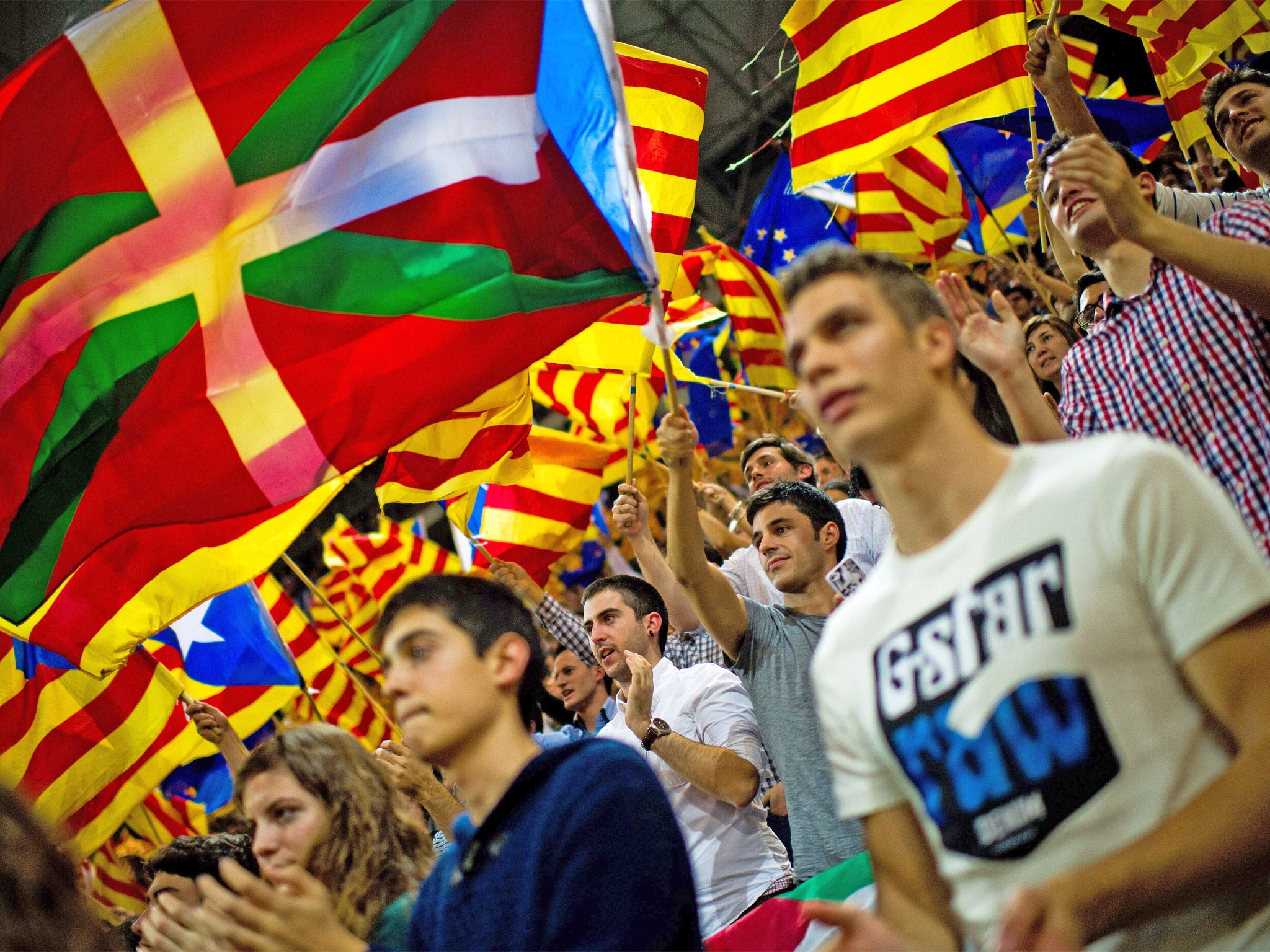Nationalists triumph in Catalan elections
But lack of clear mandate for leading party casts doubt on prospects for independence referendum

Your support helps us to tell the story
From reproductive rights to climate change to Big Tech, The Independent is on the ground when the story is developing. Whether it's investigating the financials of Elon Musk's pro-Trump PAC or producing our latest documentary, 'The A Word', which shines a light on the American women fighting for reproductive rights, we know how important it is to parse out the facts from the messaging.
At such a critical moment in US history, we need reporters on the ground. Your donation allows us to keep sending journalists to speak to both sides of the story.
The Independent is trusted by Americans across the entire political spectrum. And unlike many other quality news outlets, we choose not to lock Americans out of our reporting and analysis with paywalls. We believe quality journalism should be available to everyone, paid for by those who can afford it.
Your support makes all the difference.Catalonia's nationalists were the clear winners in yesterday's crucial regional elections – but a significant drop in support for Artur Mas's conservative nationalists the CiU raises serious doubts over their central campaign issue of a referendum on Catalan independence.
Boosted by a major increase in backing for a breakaway state in polls since Spain's recession began in 2008, and Catalonia's biggest ever pro-independence rally on 11 September, the CiU (Convergence and Union) had adopted a far harder nationalist line in recent months.
But although the CiU remains by far the biggest political grouping in the Catalan parliament with around 50 seats, and will almost certainly form a minority government – with Mr Mas thereby gaining a second term as Catalonia's president – any chances of a referendum will now involve negotiations between CiU and the left-wing nationalist republican party, ERC, which has more than doubled its representation.
"It's evident that we are a long way off that exceptional majority we wanted, as well as clearly below the results of [the elections] of two years ago," Mas admitted, although he insisted what he called 'the process' would continue, "its been two very difficult years." "These elections haven't solved anything," Catalan political analyst Germa Capdevila told The Independent.
"Mr Mas is going to need the ERC for a referendum if he wants support for his budget, but even if the nationalists have won, it will be very hard to reach an agreement. It's a clear majority in favour of the referendum, but they're not homogenous.
"Meanwhile Madrid will be able to say that the CiU have not received the backing they were hoping for."
Participation in the regional elections was the highest since 1998, with postal votes up by 45 per cent and by early evening voting was up by 8 per cent on 2010.
Virtually the entire campaign had centred on the referendum. Other issues that would be staple electoral fare in most of Spain's 16 other regions – such as unemployment, up in Catalonia by 170,000 in the last two years, or its government's request for a €5bn bailout to stave off bankruptcy, have been barely touched upon.
With the cuts and ailing economy seemingly brushed safely under the carpet, expectations of an excellent result were high amongst the nationalist camp, with Mr Mas claiming these would be the last elections in which Spain would have a key influence.
However, unconfirmed – and strongly denied – charges of corruption in the CiU by the right-leaning Madrid-based media in the last week, along with cold feet amongst pro-independence electors about the prospect of Catalonia having to regain entrance into the European Union after any breakaway, may have taken their toll amongst potential CiU voters. With 84 per cent of the votes counted, the party was due to lose around 12 seats.
The referendum remains feasible, given the ERC has not ruled out supporting Mr Mas and his minority government, and another left-wing non-nationalist party, ICV, has said it will support it. However, the ERC is likely to demand reductions in the cutbacks in local government spending, which will make for difficult negotiations.
"If they rectify their economic policies, we will govern with them. If not, then definitely not," ERC's Oriol Junqueras warned last week.
Yet for all the backing the referendum may receive in Barcelona, the question of Madrid's resistance remains. Mariano Rajoy's ruling Partido Popular (PP) has expressed its opposition to a Catalonia-only referendum, which it states would be constitutionally illegal. The PP stopped a similar vote in the Basque country through the courts in 2008 and blocked an increase in autonomy for Catalonia through legal action in 2010.
Mr Mas had expressed a desire to hammer out some kind of deal with Mr Rajoy similar to that agreed in the UK over Scotland's vote on independence in 2014. But given Mr Rajoy's stonewalling of the referendum – "nobody is going to take the Catalans out of Spain or Europe", he claimed last week – the chances of that happening appear to be slim. The question marks over the referendum will also be likely to reawaken doubts on Catalonia's economic prospects if it became independent, particularly given its financial dependence on Spain. It accounts for 20 per cent of Spain's GDP. Spain receives around 45 per cent of Catalan exports, and could well veto Catalonia's possible application for entrance in the EU.
Mr Mas's opponents were scathing, in any case, about what would appear to be an important, whilst by no means definitive, setback for his project of independence. "He has failed in his objective of turning these elections into a personal plebiscite," the Socialist spokesman Dani Fernandez said.
Join our commenting forum
Join thought-provoking conversations, follow other Independent readers and see their replies
Comments